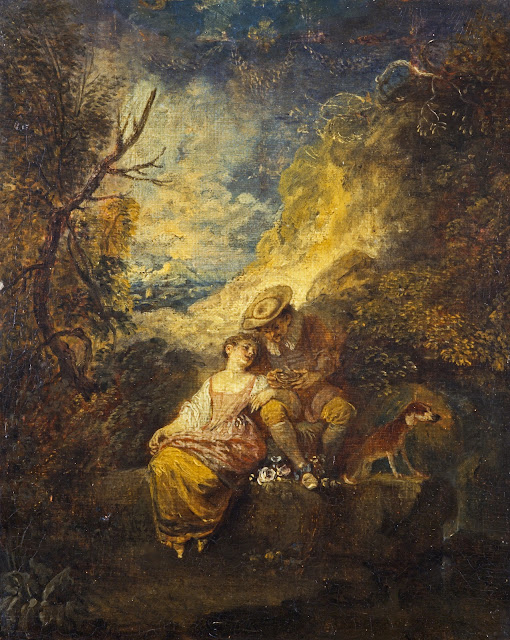 |
| Anonymous Italian artist after Giovanni da Udine Battle of Sea Deities and Sea Monsters ca. 1780 oil on canvas Fitzwilliam Museum, Cambridge |
 |
| Anonymous Italian artist after Giovanni da Udine Battle of Sea Deities and Sea Monsters ca. 1780 oil on canvas Fitzwilliam Museum, Cambridge |
 |
| Alessandro Magnasco Carthusian monks in a landscape before 1749 oil on canvas Rijksmuseum, Amsterdam |
Genie
He is affection and the present since he opened the house to foaming winter and the hum of summer, he who purified drink and food, he who is the charm of fleeting places and the superhuman deliciousness of staying still. He is affection and the future, strength and love that we, standing amid rage and troubles, see passing in the storm-rent sky and on banners of ecstasy.
He is love, perfect and reinvented measurement, wonderful and unforeseen reason, and eternity: machine beloved for its fatal qualities. We have all experienced the terror of his yielding and of our own: O enjoyment of our health, surge of our faculties, egoistic affection and passion for him, he who loves us for his infinite life.
And we remember him and he travels. . . And if the Adoration goes away, resounds, its promise resounds: "Away with those superstitions, those old bodies, those couples and those ages. It's this age that has sunk!"
He won't go away, nor descend from a heaven again, he won't accomplish the redemption of women's anger and the gaiety of men and of all that sin: for it is now accomplished, with him being, and being loved.
O his breaths, his heads, his racing; the terrible swiftness of the perfection of forms and of action.
O fecundity of the spirit and immensity of the universe!
His body! The dreamed-of release, the shattering of grace crossed with new violence!
The sight, the sight of him! all the ancient kneeling and suffering lifted in his wake.
His day! the abolition of all resonant and surging suffering in more intense music.
His footstep! migrations more vast than ancient invasions.
O him and us! pride more benevolent than wasted charities.
O world! and the clear song of new misfortune!
He has known us all and loved us all. Let us, on this winter night, from cape to cape, from the tumultuous pole to the castle, from the crowd to the beach, from glance to glance, our strengths and feelings numb, learn to hail him and see him, and send him back, and under the tides and at the summit of snowy deserts, follow his seeing, his breathing, his body, his day.
– Arthur Rimbaud, from Les Illuminations (1886), translated by John Ashbery (2011)
 |
| Francesco Guardi Forte S Andrea del Lido, Venice ca. 1760-70 oil on canvas Fitzwilliam Museum, Cambridge |
 |
| Jean-Antoine Watteau The Robber of the Sparrow's Nest ca. 1712 oil on paper, mounted on canvas, mounted on panel National Galleries of Scotland |
 |
| François Boucher Assumption of the Virgin ca. 1765 oil on canvas National Galleries of Scotland |
 |
| Hubert Robert Wooded River Landscape ca. 1798 oil on canvas Fitzwilliam Museum, Cambridge |
 |
| Jean-Baptiste Siméon Chardin Still-life - The Kitchen Table ca. 1733-34 oil on canvas National Galleries of Scotland |
 |
| Nicolaas Verkolje Two Vestal Virgins before 1746 oil on panel National Galleries of Scotland |
 |
| Thomas Gainsborough Landscape with a view of a distant village ca. 1745-55 oil on canvas National Galleries of Scotland |
 |
| Arthur Devis Portrait of Sir John van Hatten 1753 oil on canvas Fitzwilliam Museum, Cambridge |
 |
| George Knapton Portrait of Edward Morrison before 1778 oil on canvas Fitzwilliam Museum, Cambridge |
 |
| James Millar Portrait of a young man in red 1769 oil on canvas Fitzwilliam Museum, Cambridge |
 |
| Anonymous English artist Memorial to Thomas and John Fitzwilliam, died 1513 at Flodden Field against the Scots ca. 1730 oil on canvas Fitzwilliam Museum, Cambridge |